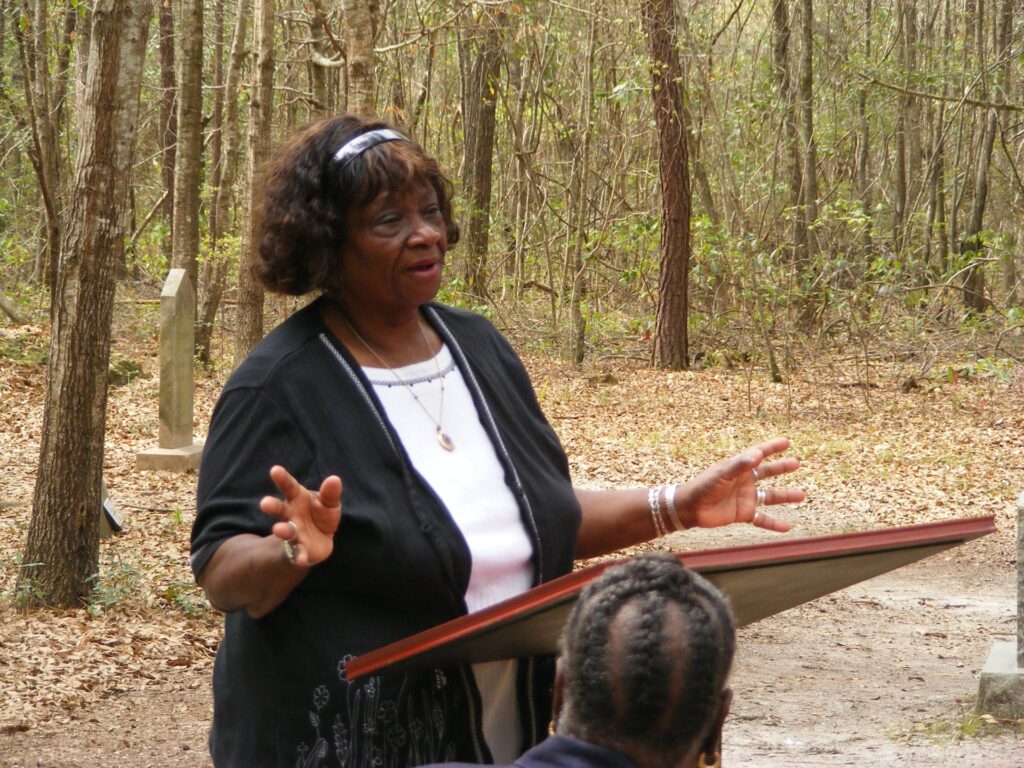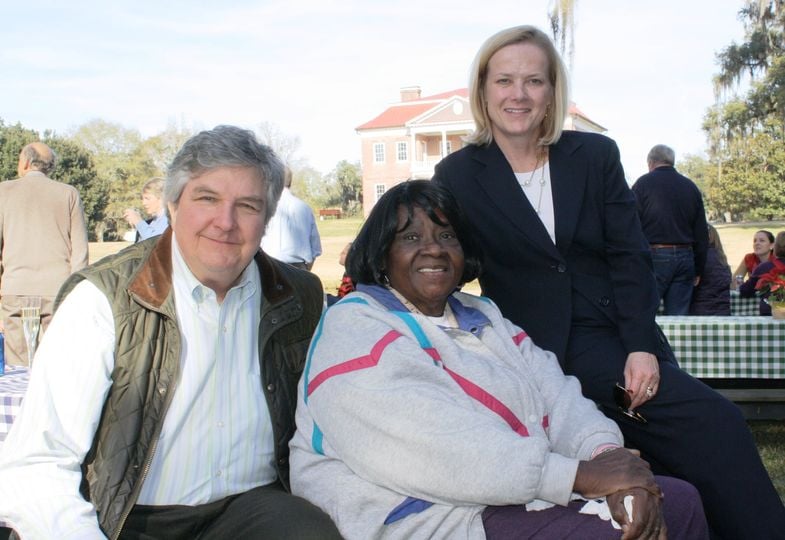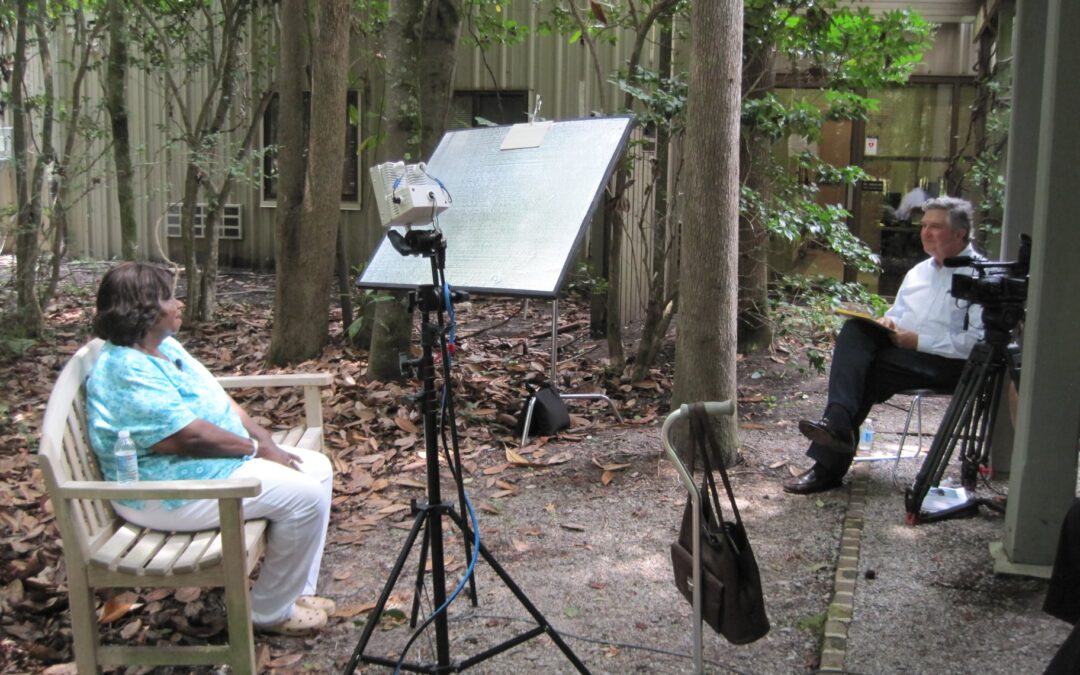.
Annie Brown Meyers (above left being interviewed by the author) was a descendant of the Bowens family and niece of Richmond Bowens. Her mother, Lucille Bowens, grew up at Drayton Hall and probably named her daughter after her mother, Anna Bowens. She instilled in Annie the values she had learned from Drayton Hall’s African American community, values which, in the 1960s, inspired her to become involved in the civil rights movement. She passed away in 2018.
GWM: Could you describe growing up during segregation? What led you to get involved in Charleston’s sit-in movement and the hospital strike?
ABM: We were taught, “Know your place. Stay in your place.” You knew when you got on the bus where your seating was and did not question it. We must sit where we were supposed to sit and do what we were supposed to do. Momma always said that, when we were inside a store, “to make sure you get a receipt, and that the merchandise you buy is put in a bag” because if anybody said we stole something, we’d have proof we’d paid for what we got.
My mother, who died in 1997, would say, “There’s a change that’s gonna come,” although she never made a big issue of it. “You gonna get involved with the movement or you’re not gonna get involved.” When I demonstrated, she never said not to. It was my choice.
I got involved with the sit-ins at Woolworth in 1960 and 1961 and at Kress in 1961. We’d go around lunchtime, sit at the fountain, and order something. We used to have to go to a little back area to order food, and they’d bring it round by the back door and serve you, but we couldn’t sit at the counter. Mother never did say, “You can’t do this or you can’t do that.” She always said, “You got to live up to what you believe in.”
I was involved with the movement downtown even though I lived west of the Ashley River. After listening to my friends from downtown, I wanted to get more insight into myself. I never liked secondhand information or hearsay. I was curious and wanted to take part in what they were doing. It was something positive.
The values my mother and father taught me and the values I learned from the nuns at school affected me. They taught us to be positive and always encouraged me to do my best. If you can make a difference, then participate in whatever you needed to do. I was going to be a part of making a difference.
Getting involved with the movement made me more mature. I worked at the hospital, and in 1969, Union 1199 came and said, “We’re going to go on strike. Are you willing to go on strike?” I said, “Yeah, I’m ready.” At that time, I was more hardcore. Whatever it took, I was there. I marched. I went to jail.
When I called Momma and them to say I was in jail, they asked, “You are where?” I said, “They locked me up.” My momma replied, “Oh, my goodness. You know what I told you: ‘If you go out there, you know the consequence of it.’ You want us to come and take you out?” I said, “No, I’m going to stay right here.”
Ralph Abernathy, Mrs. King, and Jesse Jackson came. It was interesting to listen to them. They always gave positive encouragement to believe in yourself.
Excerpt from my book, Drayton Hall Stories; Annie Brown Meyers has since deceased.

Annie Brown Meyers speaks at one of many public programs held at the African American cemetery at Drayton Hall.

 George W. McDaniel, Ph.D., is President of McDaniel Consulting, LLC, a strategy firm that helps organizations use history to build bridges within itself and to its broader constituents. The company’s tag line, “Building Bridges through History,” is grounded in McDaniel’s personal beliefs and his experience in site management, preservation, education, board development, fundraising, and community outreach. Rather than using history to divide us, he strives to help organizations use history, especially local history, to enhance cross-cultural understanding and to support local museums, preservation, and education. Dr. McDaniel led volunteer efforts with Emanuel AME Church and historical organizations in Charleston to use historic preservation to enhance racial reconciliation and healing. McDaniel is also the Executive Director Emeritus of Drayton Hall, a historic site in Charleston, SC, owned by the National Trust for Historic Preservation. He retired from Drayton Hall in 2015 after 25 years of distinguished service.
George W. McDaniel, Ph.D., is President of McDaniel Consulting, LLC, a strategy firm that helps organizations use history to build bridges within itself and to its broader constituents. The company’s tag line, “Building Bridges through History,” is grounded in McDaniel’s personal beliefs and his experience in site management, preservation, education, board development, fundraising, and community outreach. Rather than using history to divide us, he strives to help organizations use history, especially local history, to enhance cross-cultural understanding and to support local museums, preservation, and education. Dr. McDaniel led volunteer efforts with Emanuel AME Church and historical organizations in Charleston to use historic preservation to enhance racial reconciliation and healing. McDaniel is also the Executive Director Emeritus of Drayton Hall, a historic site in Charleston, SC, owned by the National Trust for Historic Preservation. He retired from Drayton Hall in 2015 after 25 years of distinguished service.
A frequent writer, speaker, and facilitator about such issues, he can be reached at gmcdaniel4444@gmail.com or through his website at www.mcdanielconsulting.net.
All images courtesy of the author unless otherwise noted.

 McDaniel Consulting LLC is a strategy firm that helps organizations use history to build bridges within itself and its broader constituents.
McDaniel Consulting LLC is a strategy firm that helps organizations use history to build bridges within itself and its broader constituents.